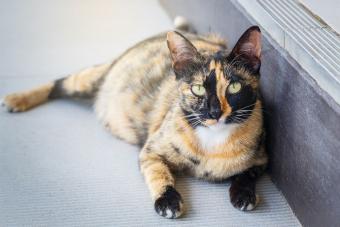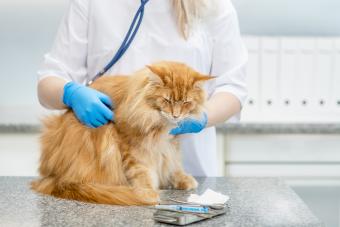
If your kitty seems to be having problems with regularity, you can use olive oil as a natural remedy for feline constipation. That's right; the same olive oil you cook with can help move your cat's stool along. Learn how to tell if your cat is constipated and how to use this method, along with several other home remedies to relieve their constipation.
Using Olive Oil as a Cat Constipation Remedy
Olive oil is a safe and effective method for treating felines experiencing constipation. Why? Olive oil works as a lubricant and softens the feces in a cat's body, allowing it to pass more easily.
Treating cats with olive oil is a much simpler and less stressful alternative to your veterinarian administering an enema. Your cat should experience relief within a few hours of consuming olive oil.
Extra-virgin olive oil is the purest form of olive oil available, so using this kind of oil is the best option for your cat.
Olive Oil Dosage if Your Cat Is Constipated
For a mild bout of constipation, give your cat ½ to 1 tablespoon of olive oil, or five to 10 drops if you use a dropper. For the easiest administration, add the oil to your cat's food.
Never force olive oil into your cat's mouth. Always add it to their food.
When You Shouldn't Use Olive Oil for Your Cat's Constipation
Olive oil is not a suitable treatment for felines with recurring constipation issues. It contains terpenic acids and phenolic compounds, which a cat's liver has difficulty processing properly. Only use olive oil in small doses, and bring your cat to the veterinarian immediately if any side effects occur or your cat's constipation persists.
Olive Oil Side Effects
Olive oil should not have any side effects for your cat when administered infrequently in small doses, although excessive amounts may cause diarrhea. Cats in poor health may have trouble digesting oils, so speak with your veterinarian before administering olive oil to a cat in ailing health.
Other Natural Home Remedies for Cat Constipation
In addition to using olive oil, there are several home remedies you can try for your cat's constipation. You likely already have these items in your kitchen, but if not, they are readily available at all grocery stores.
Coconut Oil
Coconut oil can be beneficial for cats in many scenarios, including constipation. It works in the same way as olive oil to lubricate the stool and help it move through the colon.
- Coconut oil dose for cat constipation: ½ teaspoon per 10 pounds of weight once per day.
Psyllium Husk
Psyllium husk powder, more commonly known by the brand name Metamucil, is a bulk-forming laxative that can help constipated cats. It's made from seed husks, so it is entirely natural. Just make sure your kitty drinks a lot of fluids to avoid getting even more constipated from the fiber.
- Psyllium husk dose for cat constipation: ½ to 1 teaspoon once per day mixed in your cat's food.
Pumpkin
This fiber-rich squash could help provide your cat some relief. Pumpkin is loaded with fiber and also has a high water content. Use only plain canned pumpkin (not pumpkin pie mix) or boiled pumpkin prepared at home. Just know not all cats like the taste or texture of pumpkin.
- Pumpkin dose for cat constipation: ½ to 1 teaspoon one to two times per day.
Aloe Vera Juice
Some holistic clinicians recommend aloe vera juice as a solution for constipation in both humans and pets. Aloe can have negative effects on the kidneys, so check with your vet before giving this to your cat. Avoid any products that contain aloe latex or that have additives.
- Aloe vera juice dose for cat constipation: ½ to 1 teaspoon once per day.
Canned Cat Food
Increasing your cat's water intake is an important part of clearing up their constipation, and wet food can help with this. This is particularly key if your cat eats solely kibble or dry food. Offer them wet food with some warm water added to get some fluids in them. This should help get things moving.

Recognizing When Your Cat Is Constipated
There are many factors that contribute to constipation in cats, including diet, dehydration, tumors, kidney function, obesity, or a dirty litter box. Cats are easily stressed, and any kind of stress they experience may also contribute to constipation.
The easiest way to tell if your cat is suffering from constipation is by checking the litter box. Most cats defecate at least once per day. If your cat has gone two days without pooping or has dry, hard, thin, or small stool, they may be constipated. If you have multiple cats, it is easiest to tell if one of them is constipated if you see one of your cats:
- Straining or yowling while attempting to use the litter box
- Not eating
- Occasionally vomiting
- Has a swollen anus
When to See a Veterinarian About Your Cat's Constipation
If your cat does not have a bowel movement within a few hours of consuming olive oil or another home remedy, it is best to contact your veterinarian to see if they can recommend another treatment. Other signs you should seek your vet's guidance include:
- If your cat begins vomiting, loses their appetite, or appears lethargic after consuming olive oil, contact your veterinarian immediately.
- Symptoms of a urinary blockage or bowel obstruction in cats are similar to cat constipation; however, these blockages can be fatal. If you see your cat straining or they have blood in their urine or feces, take your cat to the veterinarian right away.
- If your cat experiences frequent constipation, there may be a problem with their diet. Olive oil and home remedies are a temporary solution, so examin the cause of your cat's constipation and speak to your veterinarian.
Preventing Feline Constipation
Fortunately, there are safety measures you can take to prevent your cat from becoming constipated in the first place.
- Groom your cat regularly to minimize the amount of fur they lick up and swallow.
- Keep your cat's stress to a minimum.
- Scoop and clean the litterbox(es) regularly.
- Encourage your cat to drink fluids to keep them hydrated.
- Help your cat maintain a healthy weight through exercise and diet.
- Keep your cat active, as exercise is important for digestive movement.
Relieving Your Cat's Constipation With Home Remedies
Constipation is an uncomfortable ailment for cats to experience, so the quicker you can address the issue, the better. Olive oil is a safe and non-invasive method of encouraging your cat's bowel movements quickly and easily. Other home remedies may work, as well, but keep an eye on your cat and take them in if you don't see improvement.







